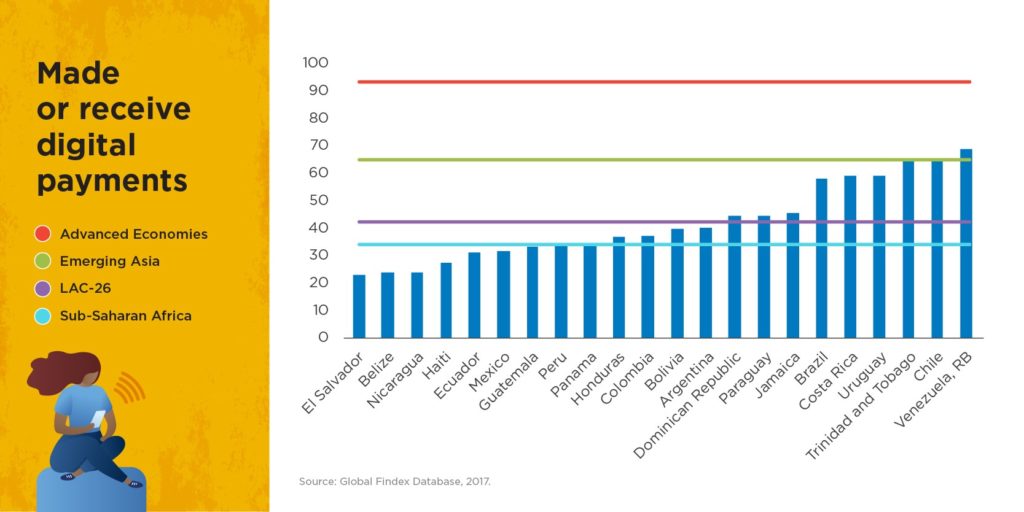Fintech Solutions as a Vehicle to Expand Financial Inclusion in Latin America and the Caribbean

A financial sector that does not prioritize financial inclusion cannot spread the benefits of economic growth to all levels of society. In fact, financial inclusion has been recognized as an enabler of 7 of the 17 Sustainable Development Goals. Promoting access to financial products and services triggers innovation, growth and a broader access to international markets.
In the case of individuals and households, proper access to financial services is crucial to make critical investments, such as higher education and mortgage financing, as well as saving for retirement or starting a business. Access to financial services, including insurance products, is also crucial for coping with unexpected and disruptive events, such as a period of unemployment or health related issues, helping the most vulnerable groups avoid financial losses and mitigate the risk of poverty.
Although with high heterogeneity between Latin American and Caribbean (LAC) countries, the region is consistently behind the most advanced economies and Emerging Asia in a wide range of financial inclusion indicators. According to the Enterprise Surveys, access to finance is a major constraint for doing businesses for the region’s small and medium enterprises, or SMEs.
Also, according the 2017 Global Findex, only 51 percent of the household population in LAC have an account at a formal financial institution, much lower than the average for Emerging Asia (78 percent) and the group of advanced economies (96 percent). Moreover, several countries in Latin America and the Caribbean such as Haiti, Nicaragua, El Salvador, Paraguay and Mexico, show account penetration levels like those in Sub-Saharan Africa, the region that groups the poorest countries in the world.
A digital path to financial inclusion
There are several factors that explain these gaps, such as high levels of informality in the region, stringent documentation requirements to open bank accounts, low penetration of financial products such as leasing and factoring, deficiency or nonexistence of credit information services, lack of adequate public registries for real and movable property, and low financial literacy, among others.
These factors hinder financial inclusion as they generate information asymmetries, promote a risk averse financial industry and pushes households and businesses away from the formal financial system.
In this context, the digital transformation that the economies in the region are undergoing, including financial services, are a welcoming sign. Fintech firms appear as a relevant solution, not only to increase financial inclusion, but also competition, innovation and to deepen financial development.
With smartphone penetration increasing exponentially in Latin America and the Caribbean (and in developing countries in general), a growing communications infrastructure and regulators beginning to embrace the importance of these initiatives, there is an increasing opportunity for SMEs and individuals to access basic financial services through different types of technological applications and innovative solutions.
Fintechs and the disruption in the financial sector
The incorporation of Fintechs in Latin America and the Caribbean is having a disruptive effect in the financial sector, as they have successfully ventured into many of the segments that were the traditionally domain of banks.
For example, the figure below shows the share of the adult population that made or received digital payments during 2017 in 26 Latin America and the Caribbean countries, compared to regional averages. As previously noted, there is profound heterogeneity of performance between Latin America and the Caribbean countries, and the regional average is much lower than the group of advanced economies as well as Emerging Asia.

[Percentage of population that made/receive digital payments]
It’s worth noting that Venezuela stands out as the country with the highest penetration of digital payments in the region, which is partly explained by the high levels of inflation that have made paper-money transactions almost impossible. Although the Venezuelan case involves a basic financial service (cash transactions), it nonetheless illustrates the power of digital solutions to integrate a wide segment of the population, particularly in a country undergoing a severe economic crisis that has dramatically reduced traditional banking activities.
And even though the Fintech space in the Latin America and the Caribbean region appears to be incipient, it is growing fast. In fact, a recent IDB Study shows that while there were 703 Fintech start-ups in 15 Latin American countries during 2017, that number increased by 66 percent the following year, to 1,166 Fintech start-ups. Payment and remittances, lending, and enterprise financial management are the three largest business segments, followed by personal financial management, crowdfunding and enterprise technologies for financial institutions.
While some commercial banks may perceive the role of Fintech companies as a threat, most of them are embracing these technologies in their product offering, achieving greater efficiencies and increasing the integration of the unbanked population.
Fintechs and digital banking services offer a unique opportunity to serve previously underbanked individuals and SMEs. To seize this opportunity, it is important to have appropriate regulatory frameworks in place that facilitate the incorporation of these technological solutions in an efficient manner.
IDB Invest and the private sector have a role in supporting digital transformation initiatives and deepen the collaboration with Fintech firms to close the gaps of financial inclusion and promote responsible finance practices in the region.
LIKE WHAT YOU JUST READ?
Subscribe to our mailing list to stay informed on the latest IDB Invest news, blog posts, upcoming events, and to learn more about specific areas of interest.
Subscribe


